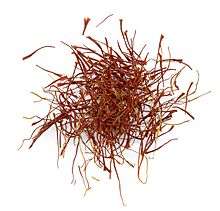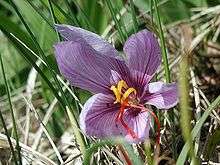Definify.com
Webster 1913 Edition
Saffron
Saf′fron
(?; 277)
, Noun.
[OE.
saffran
, F. safran
; cf. It. zafferano
, Sp. azafran
, Pg. açafrão
; all fr. Ar. & Per. za’ farān
.] 1.
(Bot.)
A bulbous iridaceous plant (
Crocus sativus
) having blue flowers with large yellow stigmas. See Crocus
. 2.
The aromatic, pungent, dried stigmas, usually with part of the stile, of the
Crocus sativus
. Saffron is used in cookery, and in coloring confectionery, liquors, varnishes, etc., and was formerly much used in medicine. 3.
An orange or deep yellow color, like that of the stigmas of the
Crocus sativus
. Bastard saffron
, Dyer's saffron
(Bot.)
See
– Safflower
. Meadow saffron
(Bot.)
, a bulbous plant (
– Colchichum autumnale
) of Europe, resembling saffron. Saffron wood
(Bot.)
, the yellowish wood of a South African tree (
– Elaeodendron croceum
); also, the tree itself. Saffron yellow
, a shade of yellow like that obtained from the stigmas of the true saffron (
Crocus sativus
).Saf′fron
(?; 277)
, Adj.
Having the color of the stigmas of saffron flowers; deep orange-yellow;
as, a
. saffron
face; a saffron
streamerSaf′fron
,Verb.
T.
To give color and flavor to, as by means of saffron; to spice.
[Obs.]
And in Latyn I speak a wordes few,
To
To
saffron
with my predication. Chaucer.
Webster 1828 Edition
Saffron
SAF'FRON
,Noun.
1.
A plant of the genus Crocus. The bastard saffron is of the genus Carthamus, and the meadow saffron of the genus Colchicum.2.
In the materia medica, saffron is formed of the stigmata of the Crocus officinalis, dried on a kiln and pressed into cakes.SAF'FRON
,Adj.
SAF'FRON
,Verb.
T.
Definition 2026
Saffron
Saffron
See also: saffron
English
Proper noun
Saffron
- A female given name; a rare flower name from the saffron.
Related terms
- Saffy (rare diminutive short form)
saffron
saffron
See also: Saffron
English

saffron (spice): the dried threads from the stigma of Crocus sativus
Noun
saffron (countable and uncountable, plural saffrons)
- The plant Crocus sativus, a crocus.
- 2009, D. H. Sanaeinejad, S. N. Hosseini, Regression Models for Saffron Yields in Iran, Daoliang Li, Chunjiang Zhao (editors), Computer and Computing Technologies in Agriculture II, Volume 1, page 510,
- Usually the maximum temperature for October, November and December in the southern parts of Khorassan–the main saffron growing area of the Iran-does not exceed 20°C, while the minimum temperature reaches 0°C.
- 2009, D. H. Sanaeinejad, S. N. Hosseini, Regression Models for Saffron Yields in Iran, Daoliang Li, Chunjiang Zhao (editors), Computer and Computing Technologies in Agriculture II, Volume 1, page 510,
- A spice (seasoning) and colouring agent made from the stigma and part of the style of the plant, sometimes or formerly also used as a dye and insect repellent.
- c. 1430 (reprinted 1888), Thomas Austin, ed., Two Fifteenth-century Cookery-books. Harleian ms. 279 (ab. 1430), & Harl. ms. 4016 (ab. 1450), with Extracts from Ashmole ms. 1429, Laud ms. 553, & Douce ms. 55 [Early English Text Society, Original Series; 91], London: N. Trübner & Co. for the Early English Text Society, volume I, OCLC 374760, page 11:
- Soupes dorye. — Take gode almaunde mylke […] caste þher-to Safroun an Salt […]
- 1658, Thomas Muffet, The Theatre of Insects, [1634, Insectorum sive Minimorum Animalium Theatrum], quoted in 2008, Anna Suranyi, The Genius of the English Nation: Travel Writing and National Identity in Early Modern England, page 117-118,
- The Irish and Ireland people (who are frequently troubled with lice, and such as will fly, as they say, in summer) anoint their shirts with saffron, and to very good purpose, to drive away the lice, but after six months they wash their shirts again, putting fresh saffron into the lye.
- 2002, James A. Duke (editor), CRC Handbook of Medicinal Spices, page 129,
- Saffron is not included in American and British pharmacopoeias, but some Indian medical formulae still include it.
- 2004, Melitta Weiss Adamson, Food in Medieval Times, page 15,
- Saffron is the stigma of the crocus flower, which is harvested by hand, dried, and sold either in strands or ground to powder. […] Of all the medieval spices, saffron was the most expensive, which is not surprising given that 70,000 flowers only yield one pound of dried stigmas. In the European cookbooks of the late Middle Ages, nearly all of which which reflect refined upper-class dining, saffron is ubiquitous.
- 2011, Mathew Attokaran, Natural Food Flavors and Colorants, unnumbered page,
- Saffron is often called the “golden spice.”
- c. 1430 (reprinted 1888), Thomas Austin, ed., Two Fifteenth-century Cookery-books. Harleian ms. 279 (ab. 1430), & Harl. ms. 4016 (ab. 1450), with Extracts from Ashmole ms. 1429, Laud ms. 553, & Douce ms. 55 [Early English Text Society, Original Series; 91], London: N. Trübner & Co. for the Early English Text Society, volume I, OCLC 374760, page 11:
- An orange-yellow colour, the colour of a lion's pelt.
-
saffron colour:
- 1973, Anthony Powell, Temporary Kings, page 82,
- These colours might have been expressly designed—by dissonance as much as harmony—for juxtaposition against those pouring down in brilliant rays of light from the Tiepolo; subtle yet penetrating pinks and greys, light blue turning almost to lavender, rich saffrons and cinnamons melting into bronze and gold.
- 2011, Seth Hunter, The Winds of Folly, unnumbered page,
- The classical shades of Antiquity were the most prevalent, but along with the Venetian reds and Egyptian blues, the saffrons and ochres and indigos, were more delicate hues: of pink and cream and lilac, like shells littered upon the shore.
-
Usage notes
The distinction between the plant and spice senses is often blurred.
Synonyms
- (colour): saffron yellow
Translations
plant
|
|
spice
|
|
dye
colour
|
|
External links
Adjective
saffron
- Having an orange-yellow colour.
Translations
colour
Derived terms
- bastard saffron (Cassine peragua)
- dyer's saffron
- meadow saffron (Colchicum autumnale)
- saffron finch (Sicalis flaveola)
- saffronize
- saffronization
- saffron terror
- Saffron Walden
- saffron wood
- saffron yellow
Related terms
See also
-
 Crocus sativus on Wikipedia.Wikipedia
Crocus sativus on Wikipedia.Wikipedia
-
 Crocus sativus on Wikispecies.Wikispecies
Crocus sativus on Wikispecies.Wikispecies
-
 Crocus sativus on Wikimedia Commons.Wikimedia Commons
Crocus sativus on Wikimedia Commons.Wikimedia Commons
- autumn crocus
- crocein
- crocoite
- crocus
- curcuma
- kumkum
- colchicum
- crocus bag
- crocus sack
- turmeric
- Appendix:Colors
Verb
saffron (third-person singular simple present saffrons, present participle saffroning, simple past and past participle saffroned)
- To add saffron to, for taste, colour etc.
